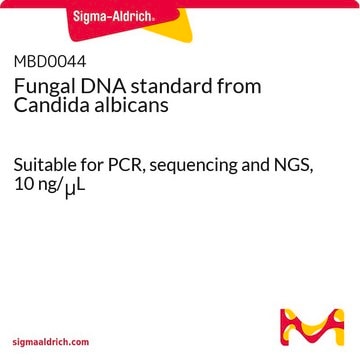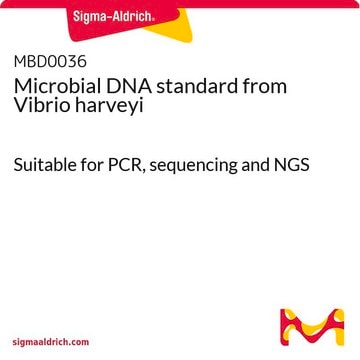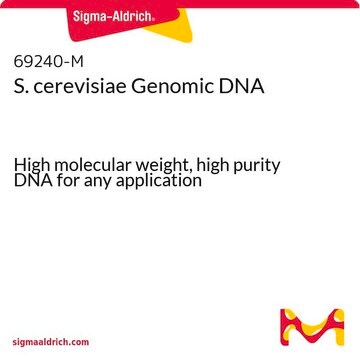MBD0038
Fungal DNA standard from Aspergillus fumigatus
Suitable for PCR, sequencing and NGS
Anmeldenzur Ansicht organisationsspezifischer und vertraglich vereinbarter Preise
Alle Fotos(1)
About This Item
UNSPSC-Code:
41105500
NACRES:
NA.24
Empfohlene Produkte
Qualitätsniveau
Form
liquid
Konzentration
10 ng/μL
Methode(n)
FISH: suitable
Versandbedingung
ambient
Lagertemp.
−20°C
Allgemeine Beschreibung
Standardization of sample analysis is essential in microbiome genomics research workflow. Lack of standardization can lead to biases and errors in common processes during sample preparation and analysis such as sample amplification, sequencing, and bioinformatics analyses.1 The human microbiome includes not only bacteria, but also viruses and fungi. While the “bacteriome” field has been researched extensively in the past years, fungi, comprising the “mycobiome”, remain relatively neglected. Fungi and yeasts have been shown to be involved in illness conditions such as cancer and gastrointestinal disease. The human gut is populated by three fungal phyla, Ascomycota, Basidiomycota, and Zygomycota.
The fungal microbial genomic DNA standard from Aspergillus fumigatus can serve as standard for benchmarking the performance along the workflow of microbiome research and metagenomic analyses, as well as a tool to increase reproducibility and allow comparison of results obtained by different labs.
Aspergillus fumigatus is an ubiquitous saprotroph fungus belonging to Ascomycota. Aspergillus fumigatus spores can induce allergic airways response after antibiotic treatment2. With increases in the number of immunosuppressed patients, there has been a dramatic increase in severe and usually fatal invasive aspergillosis, caused by the conidia of Aspergillus species. Aspergillosis is now the most common mold infection worldwide.3
The genomic DNA is provided at ≥10 ng/μL concentration in TE buffer pH 8.0. It is recommended to avoid freeze thaw cycles with this product.
Read here how to use our standards to ensure data integrity for your microbiome research.
The fungal microbial genomic DNA standard from Aspergillus fumigatus can serve as standard for benchmarking the performance along the workflow of microbiome research and metagenomic analyses, as well as a tool to increase reproducibility and allow comparison of results obtained by different labs.
Aspergillus fumigatus is an ubiquitous saprotroph fungus belonging to Ascomycota. Aspergillus fumigatus spores can induce allergic airways response after antibiotic treatment2. With increases in the number of immunosuppressed patients, there has been a dramatic increase in severe and usually fatal invasive aspergillosis, caused by the conidia of Aspergillus species. Aspergillosis is now the most common mold infection worldwide.3
The genomic DNA is provided at ≥10 ng/μL concentration in TE buffer pH 8.0. It is recommended to avoid freeze thaw cycles with this product.
Read here how to use our standards to ensure data integrity for your microbiome research.
Anwendung
Suitable as a standard for PCR, Sanger and next generation sequencing (NGS).
Leistungsmerkmale und Vorteile
- Individual microbial standard for microbiomics and meta-genomics workflow
- Suitable standard for PCR, Sanger sequencing and 18S NGS
- Improves bioinformatics analyses
- Increases reproducibility and repeatability
- Identity and purity of the genomic Aspergillus fumigatus DNA has been confirmed by 18S NGS and gel electrophoresis
Physikalische Form
Liquid -The genomic DNA is provided at ≥10 ng/μl concentration in TE buffer pH 8.0
Lagerklassenschlüssel
12 - Non Combustible Liquids
WGK
WGK 1
Hier finden Sie alle aktuellen Versionen:
Analysenzertifikate (COA)
Lot/Batch Number
Die passende Version wird nicht angezeigt?
Wenn Sie eine bestimmte Version benötigen, können Sie anhand der Lot- oder Chargennummer nach einem spezifischen Zertifikat suchen.
Besitzen Sie dieses Produkt bereits?
In der Dokumentenbibliothek finden Sie die Dokumentation zu den Produkten, die Sie kürzlich erworben haben.
Unser Team von Wissenschaftlern verfügt über Erfahrung in allen Forschungsbereichen einschließlich Life Science, Materialwissenschaften, chemischer Synthese, Chromatographie, Analytik und vielen mehr..
Setzen Sie sich mit dem technischen Dienst in Verbindung.







